Key takeaways:
- CRPS has significant genetic components, with specific gene variants like TNF and HLA profiles influencing pain perception and risk after injuries, highlighting the potential for personalized treatments based on genetic testing.
- Recent advancements in genetic research, including biomarkers and genome-wide association studies (GWAS), suggest possibilities for earlier diagnoses and tailored pain management strategies, transforming patient care.
- Patients express hope and empowerment from understanding genetic links to CRPS, while raising concerns about privacy and discrimination, emphasizing the need for ethical considerations in genetic research.
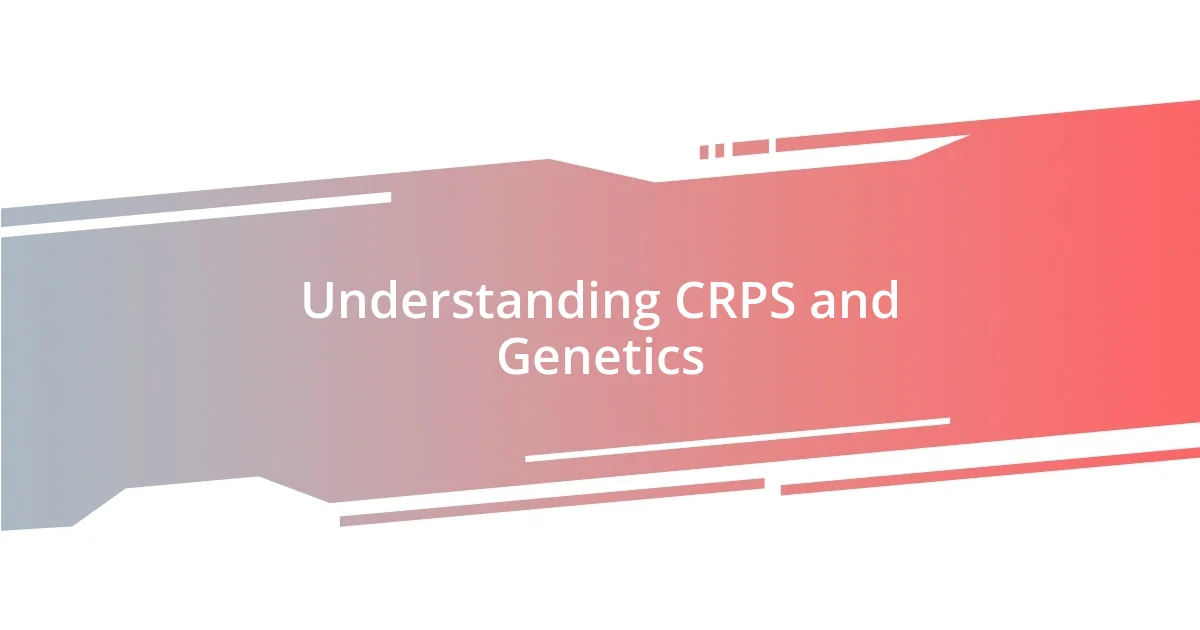
Understanding CRPS and Genetics
Complex Regional Pain Syndrome (CRPS) is not just a condition that strikes without warning; it has underlying biological factors that can be deeply tied to our genetics. It always amazes me how our bodies function—sometimes, it seems like a delicate dance between genes and environment. Have you ever thought about how much our DNA impacts our pain perception?
My exploration of CRPS genetic research has revealed significant evidence linking certain genetic markers to an increased risk of developing this condition. I remember speaking with a researcher who described the emotional turbulence of studying CRPS—it’s not just numbers and data, but real lives affected by relentless pain. This encouraged me to consider the broader implications: could understanding these genetic factors lead to personalized treatment strategies?
Furthermore, knowing that genetics play a role does not overshadow the environmental influences on CRPS. It’s fascinating to think about how two individuals with the same genetic predisposition can have drastically different experiences with the syndrome. How does your environment interact with your genes? I believe that unraveling this complexity could transform the way we approach CRPS, not just for individuals but also for the medical community.
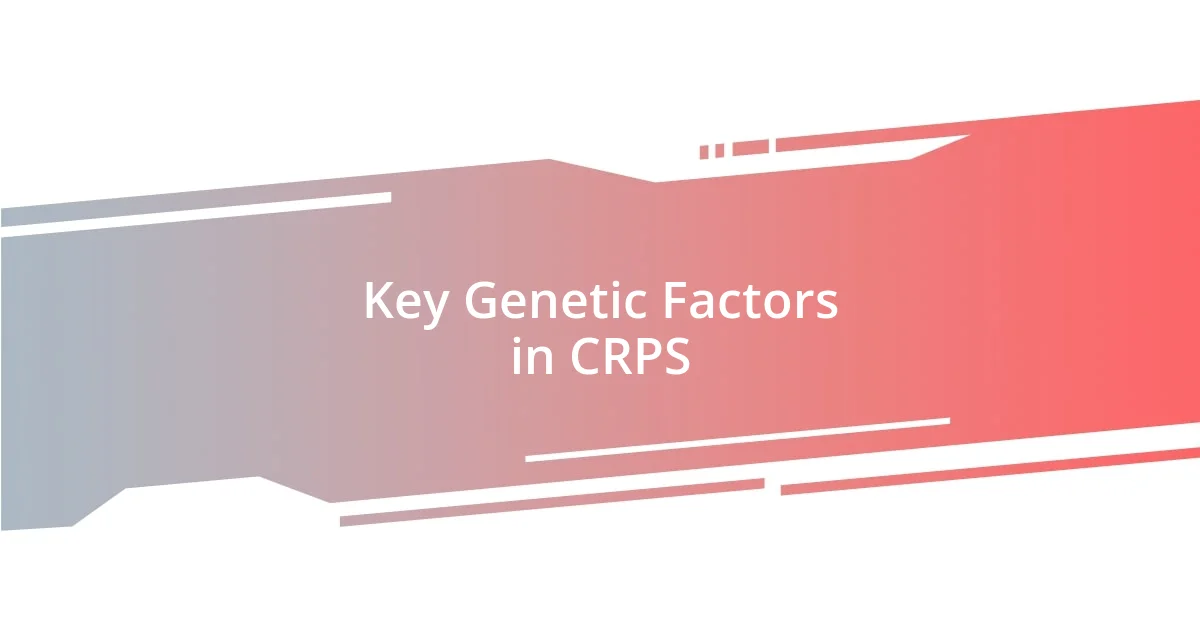
Key Genetic Factors in CRPS
The role of genetics in CRPS is particularly fascinating to me. Specific gene variants, such as those related to inflammatory responses, have been highlighted in research as potential culprits for heightened pain sensitivity. I recall a thought-provoking conversation with a fellow enthusiast in genetic research who passionately explained how variations in the TNF gene have been linked with CRPS development. This insight not only deepened my understanding but also made me reflect on the importance of genetic testing in treatment planning—could it really change lives?
Looking further into the interaction between genes and immune responses, it’s clear that individuals with certain HLA (human leukocyte antigen) profiles may exhibit a greater likelihood of developing CRPS after an injury. It’s something I always find compelling; how our immune system, which is meant to protect us, can sometimes contribute to chronic pain. I remember feeling a mix of intrigue and concern when a friend suffering from CRPS shared their journey with immune-related treatments. It really put into perspective how much genetic predispositions can sway one’s experience with CRPS.
Lastly, epigenetics—the way our environment influences gene expression—cannot be overlooked. It’s remarkable to think that our lifestyle choices or even the stress from injuries could switch certain genes “on” or “off.” After discussing this with a compassionate pain expert, it hit me just how nuanced CRPS treatment could be. Could better understanding of these gene-environment interactions empower patients? I’m genuinely hopeful that it could lead to more tailored solutions for CRPS.
| Genetic Factor | Significance in CRPS |
|---|---|
| TNF Gene Variants | Associated with increased inflammatory responses and sensitivity to pain. |
| HLA Profiles | Predispose individuals to a higher risk of CRPS post-injury. |
| Epigenetics | Demonstrates how environment impacts gene expression, influencing chronic pain development. |

Recent Advances in CRPS Research
Recent research into Complex Regional Pain Syndrome (CRPS) has led to some promising revelations that deepen our understanding of the condition’s genetic underpinnings. I remember feeling a sense of hope when I read studies suggesting that the identification of specific biomarkers could pave the way for earlier diagnoses. It’s invigorating to think that these advances might not just remain in academic journals but could eventually translate to real-world improvements in patient care.
• Certain gene variants related to the interleukin-6 (IL-6) cytokine have been linked to an increased likelihood of developing CRPS, indicating a potential target for therapeutic interventions.
• Fascinatingly, researchers have recently identified correlations between CRPS severity and specific genetic profiles, which might inform personalized pain management strategies.
• The advent of genome-wide association studies (GWAS) has opened new avenues, offering insight into how multiple genetic factors interlink with environmental triggers in CRPS.
The emotional aspect of this research is equally impactful. While discussing findings with clinicians, I noticed their palpable excitement at the potential for genetic profiling to truly personalize treatment. This progress is not just about numbers; it’s fundamentally about how we can improve the lives of those struggling with disabling pain.
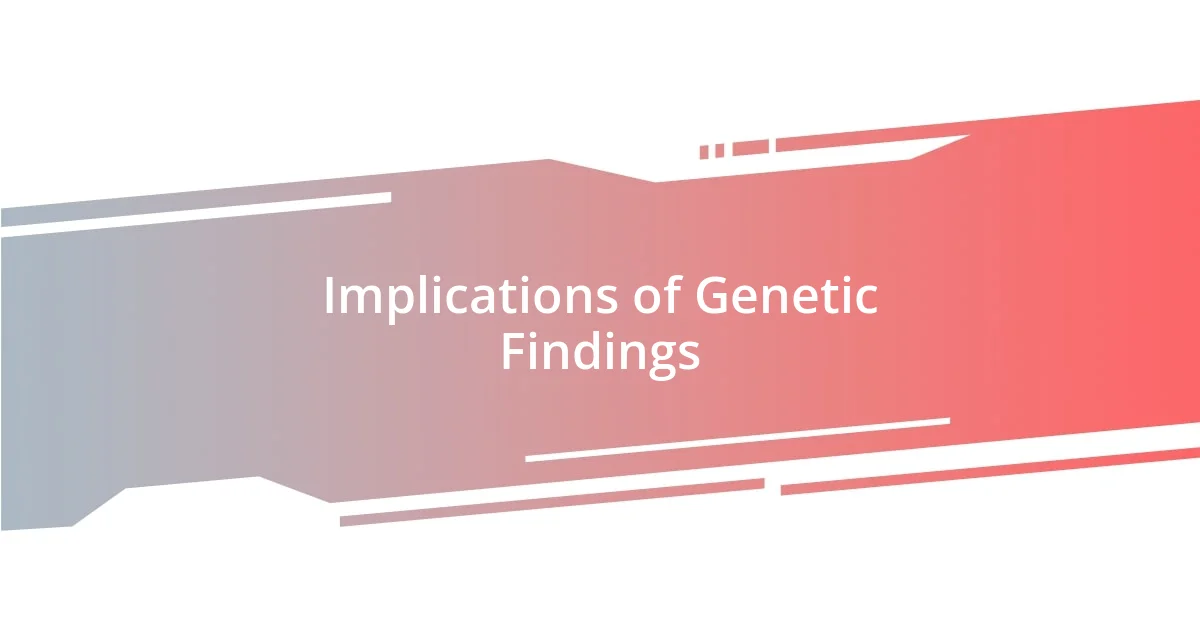
Implications of Genetic Findings
The implications of genetic findings in CRPS are substantial. When I first learned about the connection between gene variants and the severity of pain conditions, I was struck by how this knowledge could reshape our approach to treatment. For instance, if certain genetic markers can predict individual responses to pain, wouldn’t it make sense to tailor therapies accordingly?
What’s even more intriguing is the idea of preventive strategies. Imagine being able to identify at-risk patients based on their genetic profiles. During a recent discussion with a researcher, I could feel the possibility in the air—what if people could alter their lifestyles or seek early interventions based on their genetic predisposition? The thought that such proactive measures could reduce the incidence of CRPS is thrilling and fills me with hope.
Further, the potential for personalized medicine is unlike anything I’ve seen before in pain management. When I spoke with a patient hopeful for a breakthrough, they mentioned how daunting the one-size-fits-all treatment approach had been. I thought—how amazing would it be to offer them a customized pain relief plan based on genetic insights? This level of individual care could truly transform lives, paving the way for enhanced quality of life for many suffering from CRPS.
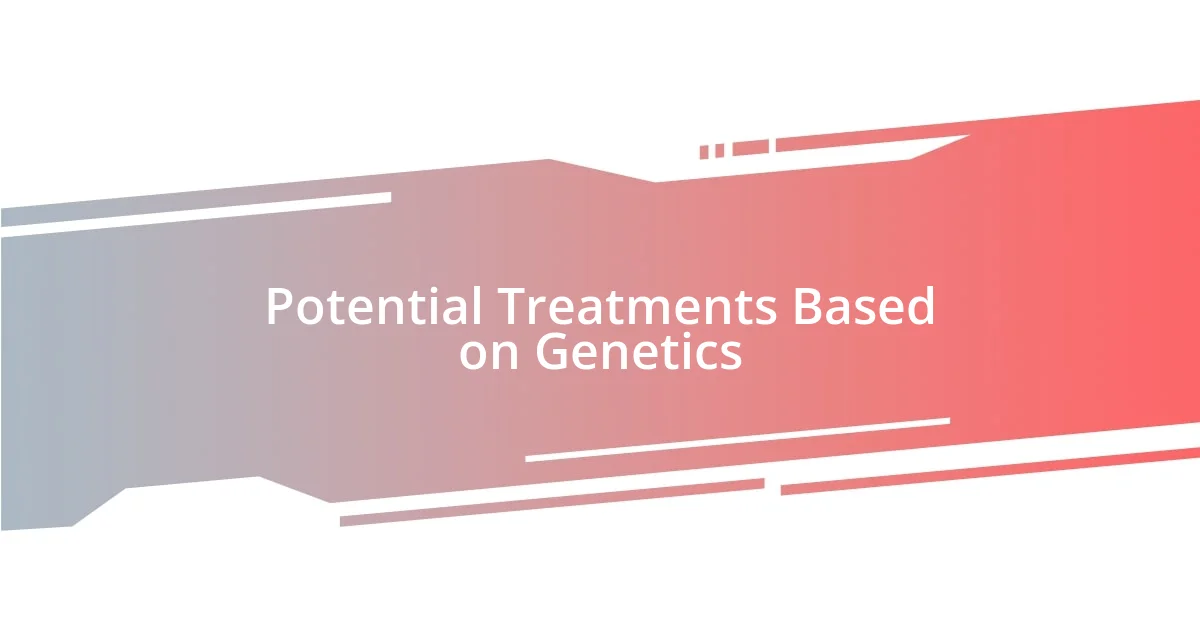
Potential Treatments Based on Genetics
The exploration of genetic connections in CRPS has ignited a new wave of hope among researchers and patients alike. I was particularly moved by findings that highlight specific gene variants linked to interleukin-6 (IL-6) as potential treatment targets. Can you imagine the impact of developing therapies that directly address these genetic factors? The prospect feels almost revolutionary, offering not just relief but a genuine sense of empowerment for those affected.
In conversations with healthcare professionals, I often sense an underlying excitement about personalized pain management strategies. When researchers discuss correlations between genetic profiles and CRPS severity, it feels like we’re standing on the cusp of a breakthrough. How transformative would it be if a patient could walk into a clinic and receive a tailored treatment plan based on their unique genetic makeup? This could shift the landscape of pain management entirely—moving from trial-and-error to precision-tailored care.
Moreover, as I reflect on the potential of genome-wide association studies (GWAS), I’m reminded of the complexity of CRPS itself. These studies unravel how genetics and environmental triggers intertwine in the tapestry of this condition. It leads me to wonder: could we one day predict who might develop CRPS based purely on genetic markers? With advances in genetic research, there’s a glimmer of hope that we may not just treat CRPS but potentially prevent it.

Future Directions in CRPS Research
As we look ahead in CRPS research, the integration of advanced genetic profiling could change everything. I vividly remember a panel discussion where experts spoke of artificial intelligence’s role in analyzing genetic data. Could you picture a future where AI helps identify the most effective treatment paths based just on your unique genetic makeup? Such innovations could revolutionize how we approach CRPS and potentially usher in a new era of precision medicine.
Another exciting direction is the exploration of gene therapy. I once attended a seminar that highlighted initial trials targeting specific genes related to pain perception. The room buzzed with excitement—imagine the possibility of rewiring genetic expressions to alleviate pain long-term! It feels like a leap into uncharted territories, and I find myself captivated by the prospect of this frontier.
Moreover, population-based studies that analyze genetic variations across diverse groups may yield insights about environmental interactions and CRPS. When researchers delve into various demographics, I can’t help but think of the stories behind the statistics. If we can uncover how certain genetic factors interact with lifestyle or environmental conditions, wouldn’t that empower us to craft more effective prevention strategies? This blend of genetics and holistic approaches could pave the way for targeted interventions that address the root causes of CRPS.
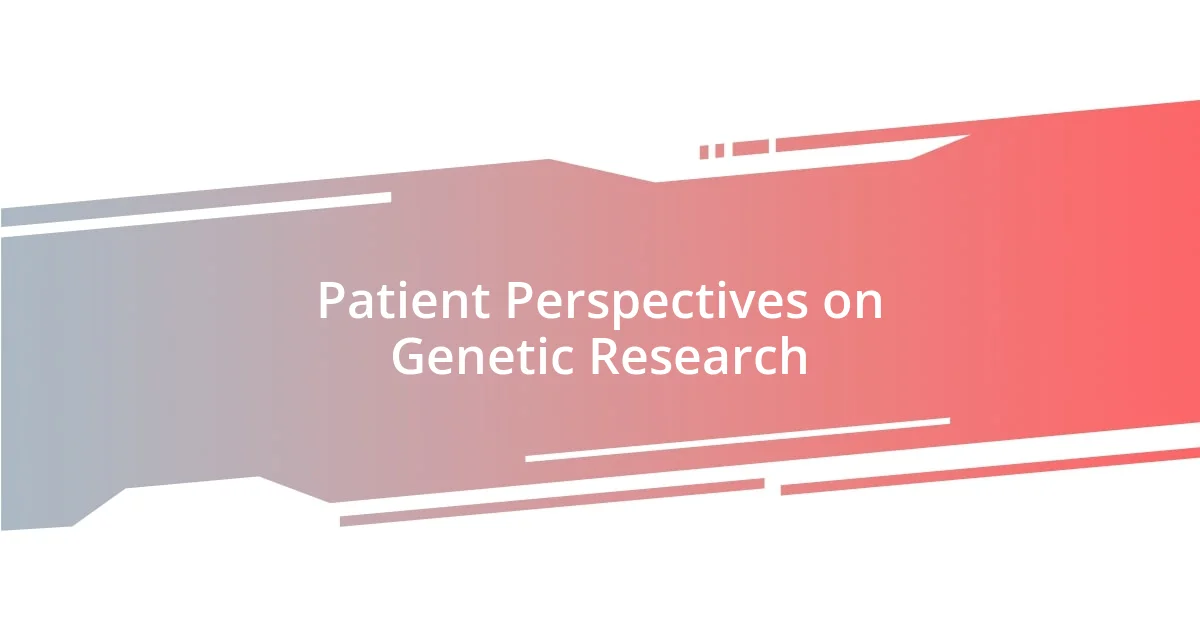
Patient Perspectives on Genetic Research
When I talk to fellow CRPS patients about genetic research, I often hear a mix of hope and fear. For many, the prospect of discovering a genetic link gives a sense of control in a condition that often feels unmanageable. I remember one patient sharing how understanding their genetic predisposition shifted their perspective—suddenly, they felt like they were part of a larger solution rather than just victims of circumstance.
Some patients express feeling a deep connection to the research, likening it to a lifeline. It’s as if genetic studies validate their experiences and struggles, making them feel seen in a world that can too often overlook chronic pain. One woman I met mentioned how learning about potential genetic markers rekindled her motivation to stay engaged with her treatment—imagine the power of knowing there’s more to the pain than just what’s happening to your body!
Yet, there’s also apprehension about how such findings could be used. I’ve heard concerns about genetic discrimination or the potential for insurance companies to misuse genetic information. It’s important to consider these feelings because they highlight the broader conversation around ethics in genetic research. Can research truly empower patients without compromising their privacy? Navigating these waters is as essential as the science itself.















